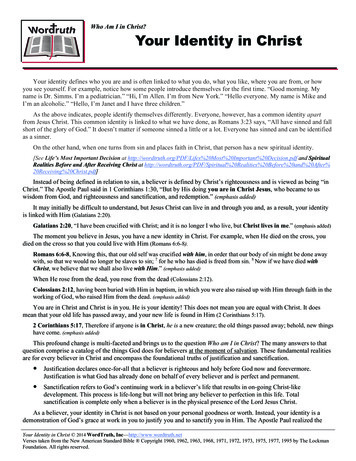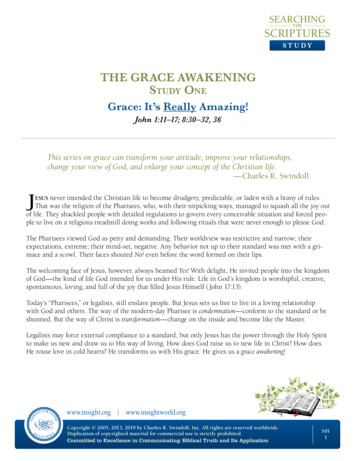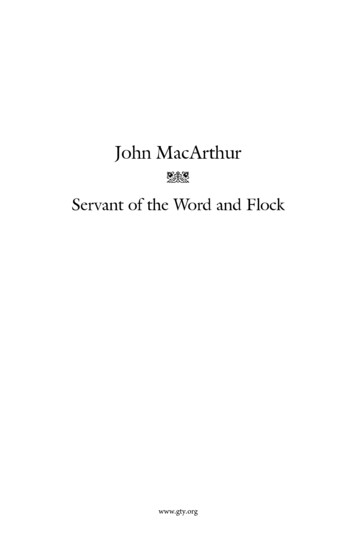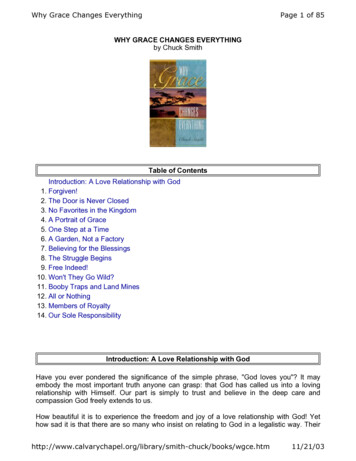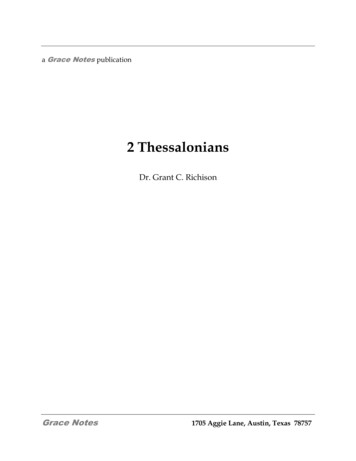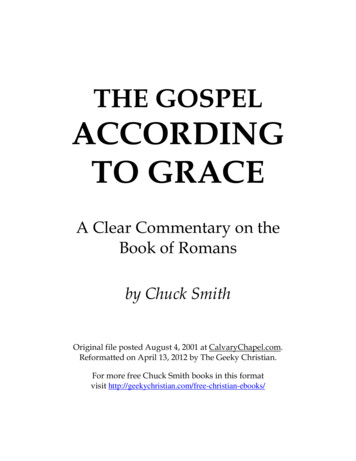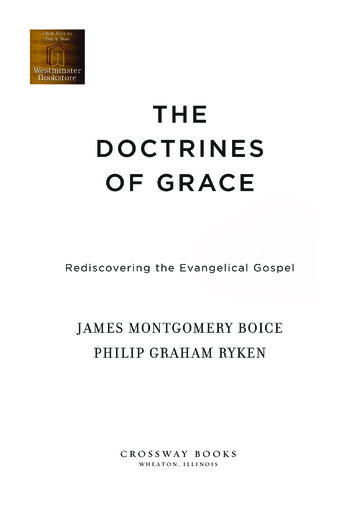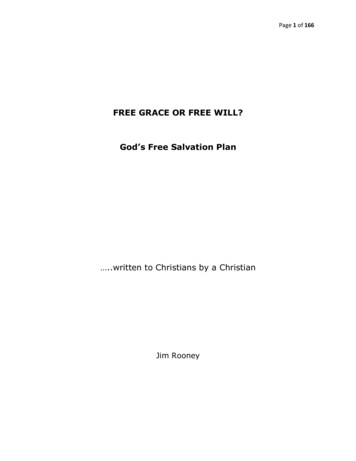
Transcription
Page 1 of 166FREE GRACE OR FREE WILL?God’s Free Salvation Plan .written to Christians by a ChristianJim Rooney
Page 2 of 166FREE GRACE OR FREE WILL?God’s Free Salvation PlanCopywrite 2011By James P. RooneyAll rights reservedNote: All scripture used is from the New King James Version (NKJV).
Page 3 of 166Amazing GraceJohn Newton(1725-1807 / England)Amazing grace! (how sweet the sound!)That sav'd a wretch like me!I once was lost, but now am found;Was blind, but now I see.'Twas grace that taught my heart to fear,And grace my fears reliev'd;How precious did that grace appear,The hour I first believ'd!Thro' many dangers, toils, and snares,I have already come;'Tis grace has brought me safe thus far,And grace will lead me home.The Lord has promis'd good to me,His word my hope secures;He will my shield and portion be,As long as life endures.Yes, when this flesh and heart shall fail,And mortal life shall cease;I shall possess, within the veil,A life of joy and peace.This earth shall soon dissolve like snow,The sun forbear to shine;But God, who call'd me here below,Will be for ever mine.(PoemHunter.com)
Page 4 of 166Table of ContentsIntroduction .6Chapter 1Common Ground . .8Chapter 2”Let’s Start At The Very Beginning” . 11Chapter 3Spiritual Death – What Does It Mean?.18Chapter 4Free Will Salvation – How Does It Work?.27Chapter 5Free Grace Salvation – The Work of God the Father 37Chapter 6Free Grace Salvation – The Work of God the Son .55Chapter 7Free Grace Salvation – The Work of God the Holy Spirit .77Chapter 8Who Chose Whom?.99Chapter 9Doesn’t God Want Everyone To Be Saved?.105Chapter 10Wait A Minute, This Just Doesn’t Seem Fair . 124Chapter 11Is Salvation Based On The View One Holds?.139Chapter 12The Challenge .143Chapter 13Final Thoughts . .150
Page 5 of 16617that the God of our Lord Jesus Christ, the Father of glory, may giveto you the spirit of wisdom and revelation in the knowledge of Him,18the eyes of your understanding being enlightened; that you mayknow what is the hope of His calling, what are the riches of the gloryof His inheritance in the saints,19and what is the exceeding greatnessof His power toward us who believe, according to the working of Hismighty power (Eph. 1:17-19)The Apostle Paul
Page 6 of 166IntroductionThis book is written to Christians by a Christian. It deals with one ofthe most important topics facing believers in Jesus Christ. It involvesa controversy within our Lord’s church that has been going on forcenturies. This issue is important as it deals with the biblical truth ofwhy we are saved and how we are saved. It is extremely importantthat we, as Christians, know the answers to those two key questionsso that we can correctly teach others this truth and so that we canproperly glorify our Lord for the special grace He has given to us whobelieve.Since this is a sensitive subject, I have tried to handle it with greatcare. Therefore, I will not mention any individuals, religiousorganizations, churches, or denominations. There will be no labeling ofgroups of people on either side of this issue as there are manydifferent definitions regarding such labels which are oftentimesoffensive and unfair. This book is not about counting noses. Godly menand women have been on both sides of this issue. I have tried to bekind in the choice of words used. A Christian has the right and theresponsibility to study this issue and then decide what is correctaccording to the Scriptures. Therefore the main reference source usedin this book is the Holy Bible.I would ask several things of the reader. First, please give this bookan honest review. Try to have an open mind as you go through thesepages to see if it is the truth of God or not. Test it against the HolyScriptures. Before judging or rejecting it, make sure you have read itin its entirety. In the end, you may disagree with what has beenwritten, but you will have had the courage to be exposed to somethingdifferent than what you believe. Second, challenge your own beliefsystem against the Word of God. This is always difficult to do. I had todo this myself, and I asked why other Christians believe differentlythan I did on this topic. I was willing to study this issue with an open
Page 7 of 166mind, and, when I did, I realized I had been mistaken in my beliefs onthis very important matter. Third, start at the beginning of this bookand resist the temptation to skip around so that you can have the bestreading experience and be fair in your analysis of what is written.Fourth, pray during the reading of this book that the Lord would revealto you His truth regarding this subject. Finally, as Christians, let usstudy this issue together with respect for each other, regardless ofwhich view we hold. As I said previously, there are godly men andwomen on both sides of this issue. I have kept that in mind as I havewritten this book.I take the writing of this book and the discussion of this topic veryseriously. One day I will be held accountable to my Lord for everyword that I have written here. Therefore, I can assure you I havetaken great care to make sure this book is based on the truth of HisWord. Since I have been on both sides of this issue, I feel qualified towrite this book. Many things that I will share here are among some ofthe best kept secrets in Christianity.Why was I searching for the truth about this issue years ago? Why didI change my long held beliefs regarding what is being discussed in thisbook? I firmly believe it was by the grace of God who showed me forthe first time how truly amazing His grace is. It is my hope and prayerthat the Sovereign God of the universe will use this book to reveal Hisamazing free grace to others as He did to me.
Page 8 of 166Chapter 1Common GroundAs I start this book, I want to emphasize what the proponents of bothfree grace and free will share. There are so many differences amongChristians. Some are of more importance than others. Some groupsbaptize differently, some understand the Lord’s Supper to meandifferent things, and some worship in a traditional style while others ina more modern or contemporary way. The differences are many. Theissue of this book is one topic that is debated among Christians.However, those who believe in free grace salvation and those whobelieve in free will salvation share some of the most important beliefsin Christianity.Within mainstream Christianity, both groups share the belief that oursalvation rests on our repentance of sin and on faith in the gloriousSon of God, Jesus Christ. Both groups believe that the unsaved man islost in his sins and in need of a Savior. They agree that this salvationdoes not come about by our good works but by our faith in Jesuswhich should then produce good works.There is agreement on the deity of our Lord Jesus Christ, His virginbirth, His sinless perfection, His miracles, the inerrancy of His Word,His redemption on the cross for our sins, His resurrection, Hisascension to heaven, His return one day in power and glory, theresurrection of all mankind, and the judgment. In addition, bothgroups believe in eternal life and happiness in heaven for believers inChrist and in hell, the tortuous place designed for unbelievers whomust endure everlasting punishment for their sins. With so manypoints of agreement then, what is the problem?The problem is subtle and seems unimportant at first. Some wouldsay as long as we are saved that is the most important thing. True.However, as Christians, it is imperative that we know the truth about
Page 9 of 166our salvation, why we are saved and how we are saved. If ourunderstanding on these key questions is flawed, how can we properlyfulfill the Great Commission and teach family, friends, and others thetruth about salvation? Jesus is the way, the truth, and the life. (John14:6) He wants us to know the truth on all matters He reveals inScripture, especially about His free salvation plan. Let me be clearabout this free salvation plan. While His salvation to us is free, it costthe Son of God dearly in His life on earth.Perhaps the most important reason to delve into this area is to makesure we give the complete honor, glory, and eternal thanks to Godwho so freely saved us. We must know why we should be so thankful.We must understand that we should give Him one hundred percent ofthe credit in our salvation, because we are saved totally by His gracewithout any help or assistance from ourselves. If our belief systemgives any credit or glory to the unsaved sinner in his salvation,however unintentional, then that same amount of credit and glory istaken away from God. We must not let that happen. That is not Godhonoring to Him who died for us and brought us to Himself by givingus our faith.Some might say that we shouldn’t even discuss such a topic as thisbecause they say it has nothing to do with the way we live ourChristian lives. I would disagree with that conclusion. Doctrine, whichis what we believe, does affect how we live our lives. What we believeon this issue impacts how we serve the Lord. It may cause us to try touse pressure tactics to bend the minds or wills of some to becomebelievers. It has caused some pastors to blame Christians for thedamnation of others because these pastors say these believers didn’twitness as they should have. It can become a gospel of guilt ratherthan a gospel of grace.So, the issue described in this book seems to be insignificant andsubtle to some Christians. However, it is very important. We mustbelieve the truth about our salvation, teach its truth, and give all the
Page 10 of 166glory and honor to our God who freely gave us eternal life. This is whyI wanted to write this book.Let’s us rejoice and be united in our common ground. However, let ussearch the Scriptures to make sure we understand the truthconcerning the freedom or the bondage of the human will in oursalvation.
Page 11 of 166Chapter 2“Let’s Start at the Very Beginning”In the movie, The Sound of Music, Maria sang the song, “Do Re Mi” asshe taught the children in her care how to sing. One of her first linesin the song was “Let’s start at the very beginning.” So, in discussingthis important subject before us, it is necessary for us to start at thevery beginning, to the moment of creation.The Entrance of Sin: Satan and the Fallen AngelsWe know from Scripture that, in addition to creating man, God createdangels. The purpose of these angels is to worship and serve God. TheLord created them with wills with which they could freely choose tofollow God in obedience or rebel against Him in disobedience. Theyhad free will. That is to say, they had the innate ability or power tofreely choose to do good or evil, right or wrong. What is important tonote here is that they did not have any predisposition to sin againstGod.They were created without a sin nature.Sin, which isdisobedience to God, had not entered the picture at their creation, soit could not adversely affect any of their decisions.Let me graphically describe free will to you. Think of the blindfoldedlady holding the scale of justice. A decision as to guilt or innocence ismade without any undue or external influences. The symbol of theblindfold shows there is no predisposition to choose one way or theother. The plates of the scale of justice start out being perfectlybalanced and level. There is nothing tugging downward on either sideof the scale. The evidence mounts to either guilt or innocence and thescale tips one way or the other. There is no external force causing thescale to move. It’s only about the evidence which leads to a freedecision.
Page 12 of 166This description fits well with what the angels possessed before sincame into being. They had this free will ability or power because theyhad no sin nature. As we read in Scripture, Lucifer, in his pride,wanted to be more than just an angel. He wanted to be God. Let’ssee from Scripture what took place.12“How you are fallen from heaven, O Lucifer, son of themorning! How you are cut down to the ground, you who weakened13thenations!Foryouhavesaidinyourheart:I will ascend into heaven, I will exalt my throne above the stars ofGod; I will also sit on the mount of the congregationon the farthest sides of the north; 14 I will ascend above the heights ofthe clouds, I will be like the Most High.” (Isa. 14:12-14)Lucifer freely made a choice to rebel against God. He had no outsideforce compelling him to make that choice; he did it freely in his pride.He then apparently led many angels to follow him in this rebellionagainst God. They freely made the choice to rebel against Godalthough Lucifer may have enticed them to sin. God expelled Lucifer,also called Satan, and these fallen angels from heaven.18And He said to them, “I saw Satan fall like lightning from heaven.”(Luke 10:18)“And another sign appeared in heaven: behold, a great, fiery reddragon having seven heads and ten horns, and seven diadems on hisheads. 4 His tail drew a third of the stars of heaven and threw them tothe earth. And the dragon stood before the woman who was ready togive birth, to devour her child as soon as it was born.“ (Rev. 12:3-4)So, we see here the entrance of sin into creation. The root cause waspride. However, these created beings did not possess a sin nature sothey were able to exercise their free will to sin or not to sin. Thesefallen angels are the demons we read about in Scripture.
Page 13 of 166The Fall of Man and His Free WillWhat about mankind? As we see in Genesis chapters 1 through 3,Adam and Eve were created by God in perfect innocence. They toowere created with free wills. They had no sin nature or predispositionto sin. However, Adam and Eve disobeyed God and sinned against Himby eating of the forbidden fruit from the tree of the knowledge of goodand evil. They did this after Satan, that old serpent, tempted Eve todisobey God.Now sin entered the world of mankind. Sin had reared its ugly headand entrapped many of the angelic host and now also the only twohumans on earth. The consequences of Adam and Eve’s sin broughtjudgment from God on them. They were removed from the Garden ofEden which was a paradise on earth. Man must now work hard for hissustenance. Women must suffer pain in childbirth and be under theauthority of their husbands. In addition, all mankind must experiencedeath. We will all die physically unless the Lord returns first. We alsoare spiritually dead until we come to faith in the promised redeemer,Jesus Christ, who bruised the head of the serpent.15“And I will put enmity between you and the woman, and betweenyour seed and her seed; He shall bruise your head, and you shallbruise His heel.” (Gen. 3:15)Something else happened to us humans after the fall. We becameseparated from God because of our new sin nature. Sin had tainted usterribly. Now, the desire to sin became overpowering. The lusts of theflesh and the pride of life exert great pressure on us to sin against Godand His holy Word.“For all that is in the world—the lust of the flesh, the lust of the eyes,and the pride of life—is not of the Father but is of the world.” (1 John2:16)This sin nature is passed on from generation to generation from Adamand Eve. The Scripture says we are conceived in sin.Behold, I was brought forth in iniquity, and in sin my motherconceived me. (Psalm 51:5)
Page 14 of 166The wicked are estranged from the womb; they go astray as soon asthey are born, speaking lies. (Psalm 58:3)If you don’t think infants possess a sin nature, just watch them. Theywill take the toys of other children, throw temper tantrums if theydon’t get their way, and willingly disobey their parents. This evil allcomes naturally to them because of their sin nature.Those who are unsaved have no defense against their sin nature.They seek to please themselves. However, even those of us who aresaved still have this sin nature. We have the help of the Holy Spiritand can deal with this disease called sin much better than the unsavedbecause we are spiritually alive not spiritually dead, but we still are inbondage to it.34“Jesus answered them, “Most assuredly, I say to you, whoevercommits sin is a slave of sin.” (John 8:34)In other words, if our wills commit sin, our wills are the slaves of sin.Where is the freedom of our will if our natural inclination orpredisposition is to sin?The Bible describes how corrupt our wills are because of this sinnature.11“There is none who understands; there is none who seeks after God.They have all turned aside; they have together becomeunprofitable; there is none who does good, no, not one.”13“Their throat is an open tomb; with their tongues they havepracticed deceit.” “The poison of asps is under their lips.”14“Whose mouth is full of cursing and bitterness.” 15 “Their feet areswift to shed blood; 16 destruction and misery are in their ways; 17 andthe way of peace they have not known.” There is no fear of God beforetheir eyes.” (Rom. 3:11-18)12This is not a pretty picture of the willful acts of unsaved men. So it isclear that after the fall of man due to sin, we lost the ability of freewill. Before we make any choices, the scales are already being pulleddown on one side by our sin nature making us want to choose to do
Page 15 of 166evil. This is true whether we are saved or not saved. Our wills are inbondage to sin.Do the Saved Have Free Will?To prove that even the wills of the saved are in the grips of sin anddon’t possess free will, let me give you two proofs. One is frompractical experience and one is from Scripture.First, let me ask you a question as a believer. Have you ever goneone day in your life without committing a sin in deed, word, orthought? Perhaps you may have gone one day without sin, but thatwould be very rare, if ever. In reality, we usually sin every day in ourlives in some way and usually multiple times each day. Why? What iswrong with our free will that we can’t even go such a short timewithout sinning as a Christian? How many times each day have youcommitted sin? How many times have you said to yourself that youwere not going to lose your temper, say something hurtful, unkind, orevil, not think bad or immoral thoughts, not covet something, not beenvious, not have bad feelings toward others, not be prideful, notworry, and not be fearful? Yet it happens repeatedly, day after day.How many times have you thought things that you were shocked youcould think? The answer is that our wills are not free but are enslavedto sin. (John 8:34) It is because, even as Christians, this sin natureconstantly tempts us and compels us to sin. It grieves us. Thiseveryday actual experience all of us Christians have proves our willsare not free to keep from sinning. Our natural desire is to sin.Now let me share with you the proof from Scripture. Who do youthink was the greatest Christian who ever lived besides Jesus Christ?You would probably say one of the apostles. My guess would be theApostle Paul. He actually addressed this very issue in Scripture as towhether he had free will as a Christian. Here is what he had to say:14”For we know that the law is spiritual, but I am carnal, sold undersin. 15 For what I am doing, I do not understand. For what I will to do,that I do not practice; but what I hate, that I do. 16 If, then, I do whatI will not to do, I agree with the law that it is good. 17 But now, it is no
Page 16 of 166longer I who do it, but sin that dwells in me. 18 For I know that in me(that is, in my flesh) nothing good dwells; for to will is present withme, but how to perform what is good I do not find. 19 For the goodthat I will to do, I do not do; but the evil I will not to do, that Ipractice. 20 Now if I do what I will not to do, it is no longer I who do it,but sin that dwells in me.21I find then a law, that evil is present with me, the one who wills todo good. 22 For I delight in the law of God according to the inwardman. 23 But I see another law in my members, warring against the lawof my mind, and bringing me into captivity to the law of sin which is inmy members. 24 O wretched man that I am! Who will deliver me fromthis body of death? 25 I thank God—through Jesus Christ our Lord! Sothen, with the mind I myself serve the law of God, but with the fleshthe law of sin.” (Rom. 7:14-25)Here is the translation: Paul was saying that his will wanted to doright, but it was defective and would do what was wrong. Why was itdefective and not free to choose to do right? It was the sin that dweltwithin him (vs. 20). His sin nature caused him to have a predispositionto choose sin rather than choose to do right. Paul, perhaps the mostholy Christian who ever lived besides Christ, referred to himself as a“wretched man” (vs. 24). He was deeply afflicted and distressed overhis inability to control his will to freely choose to do good or right.The main point of this book is to address the issue of the unsaved manand his spiritual inability to use a free will to come to salvation. I onlymentioned how even the saved do not have a free will spiritual abilityto show how even more depraved the unsaved man is. He is totallylost and defenseless against sin without the help of the Holy Spiritwhich we as believers possess.How Are We Free?Let me say, however, that in one sense we all have free will or freechoice. What I mean by that is we all do whatever we want to do. Weare free agents in this sense. When it comes to the everyday normalchoices we make, we freely make those choices to do what we want to
Page 17 of 166do. Although we are free beings and we freely choose to do what wewant to do, we are not free spiritual beings. This is a very importantdistinction. When it comes to making decisions about God and thethings of the Spirit, the unsaved do not have the free will spiritualability to make those decisions. We are dead spiritually, as mentionedpreviously, which means we are dead or incapable of making freedecisions of any spiritual good toward our Creator or our salvation.That ability has been totally corrupted by our sin nature. Sin destroyedour freedom of will to do right, and now we serve the lusts of our sinfulflesh. At the fall of man, what was it that fell? It was the free willability to equally choose good or evil with a view to pleasing God. Nowwe are left with an overwhelming predisposition and desire by our willsto do evil and sin against our Creator.“There is none who does good, no, not one.” (Rom. 3:12)The good news is that as Christians we have the Holy Spirit convictingus not to sin and to confess our sins once we do committransgressions. The unsaved person does not have this Helper andComforter.So here is the truth of Scripture. Since the fall of man, there is no suchthing as a free will spiritual ability or power to equally choose good orevil. Man’s inclination is to choose evil. Read again Paul’s comments inRom. 7:14-25. Man’s will is corrupted and in slavery to sin (John8:34). The unsaved individual does not understand the things of Godand will not seek God with his spiritually dead will. The Scriptures areclear on this point. (Rom. 3:11-12)Without a sin nature, we can have this free will spiritual ability.However, with a sin nature the power of free will does not exist. Wewill not shed this sin nature as long as we live unless the Lord JesusChrist returns to earth before we die. The free will belief system hascaused Christians to think they are saved ultimately by their own willand not by the will of God. Although the free will approach seemsplausible, fair, appealing, and is the most popular view withinChristianity, it has to stand the scrutiny of Scripture. Please stay withme as we examine free will more in depth scripturally and see how thisbelief system has replaced the biblical view of salvation.
Page 18 of 166Chapter 3Spiritual Death – What Does It mean?After the fall of man, we saw in Chapter 2 how radically differentmankind became. As a sinner, he became spiritually separated fromGod. Now men and women will physically die one day. Also, fromconception the human race is infected with a disease called sin, thusmen and women have a sin nature for the rest of their lives. Assinners, we are spiritually dead until the moment we are made alive byGod.Dead in Trespasses and Sins1And you He made alive, who were dead in trespasses and sins, 2 inwhich you once walked according to the course of this world, accordingto the prince of the power of the air, the spirit who now works in thesons of disobedience, 3 among whom also we all once conductedourselves in the lusts of our flesh, fulfilling the desires of the flesh andof the mind, and were by nature children of wrath, just as the others.4But God, who is rich in mercy, because of His great love with which Heloved us, 5 even when we were dead in trespasses, made us alivetogether with Christ (by grace you have been saved), 6 and raised usup together, and made us sit together in the heavenly places in ChristJesus, 7 that in the ages to come He might show the exceeding richesof His grace in His kindness toward us in Christ Jesus. (Eph. 2:1-7)Is Paul here talking about physical death or spiritual death? Of coursehe is talking about spiritual death as the people he is writing to arealive. They are alive physically, but, before they were saved, theywere dead spiritually in trespasses and sins. Spiritual death had directreference to the unsaved person’s will. It was his will that was deadspiritually. What else could it be?Let’s take a look at the heart or will condition of the unsaved mansince the fall.
Page 19 of 1665Then the LORD saw that the wickedness of man was great in theearth, and that every intent of the thoughts of his heart was only evilcontinually. (Gen. 6:5)We certainly don’t see free will here, just the will to do only evilcontinually.44You are of your father the devil, and the desires of your father youwant to do. He was a murderer from the beginning, and does notstand in the truth, because there is no truth in him. When he speaks alie, he speaks from his own resources, for he is a liar and the father ofit. (John 8:44)The unsaved person wants or wills to do the evil of his father, Satan.These verses do not describe the freedom of the will; they describe thebondage of the will and its desire to do evil.Mistaken Views of Spiritual DeathHow severe is this spiritual death? What does it mean with regard tosalvation? Let me share with you how this has been incorrectlydescribed. One story goes like this: A man is on a hospital bed and isdying. The doctor has some medicine on a spoon that the man has totake to keep him alive. It’s up to the man to take the medicine andswallow it to stay alive. The doctor has done his part; now the patientmust do his part to save his life. Here is another story: A man falls offa boat and starts to drown. Someone from the boat throws him a lifepreserver. However, the man must grab hold of the preserver to savehimself from drowning.The characters in these stories represent God who must do His partand draw men to Christ and the unsaved man who must do his partand use his free will to accept Him. Salvation becomes a two stepprocess. If both parties do their parts, the unsaved man becomessaved. Another way to say this is that if God does His part and theman does his part, then God gives the man salvation. Do you see theproblem here? Man gets salvation from God if he does something. Ifhe is faithful in using his will properly, better than others, then he gets
Page 20 of 166salvation. Does this not sound like a reward rather than a free gift?Has not the unsaved person earned or merited this gift of salvationfrom God for what he did?Let’s go back to these stories. What is wrong with these twoscenarios? What is clearly wrong is that, in both stories, the unsavedman in the hospital bed and the one drowning are not dead. They areboth alive. Let’s correct the stories to make them accurate with Eph.2:1-7.The man on the hospital bed has died physically. He is lifeless. Hecan’t take any medicine because he has suffered physical death. TheHoly Spirit comes and gives him mouth to mouth resuscitation andbrings him back to life from the dead. The same is true with theperson who is drowning. The correct biblical picture is that the manhas already drowned and lies at the bottom of the ocean floor dead.The Holy Spirit jumps into the water, swims to the bottom of theocean floor, picks him up, and swims with him back to the shore wherethe deceased man is laid down on the sand. Then the Holy Spiritbreathes the breath of life into the dead man, and he is raised to life.The Unsaved Cannot Receive Spiritual MattersWhen the Scriptures say that the unsaved person is dead in trespassesand sins, it means dead to all spiritual matters. This person isincapable of using his will to come to Christ because the will is deadspiritually. What does the Scripture say about the unsaved person’sability of will to understand or process spiritual matters? Let me sharejust a few verses in the Bible that address this matter of the spiritualinability of the unsaved man to use his will to come to salvation.14But the natural man does not receive the things of the Spirit of God,for they are foolishness to him; nor can he know them, because theyare spiritually discerned. (1 Cor. 2:14)Perhaps this is the clearest statement in all Scripture regarding theability of the unsaved person’s will to receive Christ. The unsaved ornatural man cannot receive spiritual things because he doesn’tunderstand them. He thinks these things are too foolish to even bother
Page 21 of 166with. This means his will cannot understand and receive spiritualmatters. His will is entirely lost and incapable of receiving Christ. Hecannot
Amazing Grace John Newton (1725-1807 / England) Amazing grace! (how sweet the sound!) That sav'd a wretch like me! I once was lost, but now am found; Was blind, but now I see. 'Twas grace that taught my heart to fear, And grace my fears reliev'd; How precious did that grace appear, The hour

